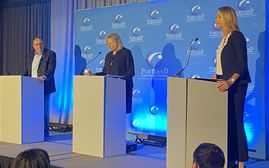LePage's budget proposal cuts funding for three 'incubator' programs
 Photo / Peter Van Allen
Maine Venture Fund's John Burns testified at a March 1 public hearing in Augusta in support of three incubator programs slated to be "zeroed out" in Gov. Paul LePage's $6.8 billion two-year state budget proposal.
Photo / Peter Van Allen
Maine Venture Fund's John Burns testified at a March 1 public hearing in Augusta in support of three incubator programs slated to be "zeroed out" in Gov. Paul LePage's $6.8 billion two-year state budget proposal.
Three incubator programs within the Applied Technology Development Center system are slated to be “zeroed out” in Gov. Paul LePage’s $6.8 billion two-year state budget proposal.
As proposed by the governor, $178,838 in funding within the Department of Economic and Community Development that historically has been shared equally by the three programs has been cut from the 2018-2019 biennial budget. The impacted programs are:
- Maine Center for Entrepreneurial Development's 15-week Top Gun training program, which has assisted more than 140 small businesses since 2006.
- Maine Aquaculture Innovation Center, which sponsors and facilitates innovative research and development projects involving food, pharmaceuticals, and other products from sustainable aquatic systems.
- Target Technology Center at the University of Maine in Orono, which is the home of the UpStart Incubator that provides coaching services and support to entrepreneurs in order to build competitive, market-oriented companies.
DECD Commissioner George Gervais told Mainebiz the proposed $178,838 funding cut was simply one of dozens of difficult decisions contained within the governor's budget proposal. Gervais acknowledged the three programs have been doing good work and said "any government would prefer not to cut any economic development funding" within its budget.
“It's a balancing act,” he said. “If we weren't shifting costs [here] we'd be shifting them from somewhere else … We do what we think is least harmful overall.”
Support voiced at public hearing
Advocates told the 128th Legislature's Appropriations and Financial Affairs Committee and the Labor, Commerce, Research and Economic Development Committee at a March 1 joint public hearing it would be a mistake to eliminate funding for the three programs.
MCED Executive Director Thomas Rainey told lawmakers the loss of MCED's $59,600 share would jeopardize its ability to continue the expansion of the Top Gun program, which in 2016 received a matching challenge grant from the federal Economic Development Administration that enabled MCED to offer it in the Bangor/Orono region and to expand its programs to Lewiston-Auburn and the Midcoast region.
“Without the DECD [$59,600] funding as a match, MCED would be unable to draw down the federal EDA grant funding that enables us to operate the statewide network and would mean the loss of a combined 25% of our overall funding,” Rainey stated in his written testimony.
Rainey told Mainebiz in a phone interview that a survey of 140 startup entrepreneurs who have graduated from the Top Gun program since 2010 shows that 121 are still in business — an 86% survival rate. Since 2006, Top Gun companies have created 300 jobs in Maine, raised $8 million in capital and have generally “bolstered the branding of Maine as a great place to start and grow a business.”
“I think we have a very compelling story to tell in terms of jobs created and the survivability of the Top Gun graduates,” Rainey said. “I'd like to think that would resonate with [lawmakers in Augusta].”
Christopher Davis, executive director of the Maine Aquaculture Innovation Center, said the center has used its share of the funding to support an aquaculture incubator program that in 2016 benefited 11 companies employing 37 people. “Four of these companies chose to move to Maine in part because of the technical and infrastructure support services this program offers,” he stated in his written testimony.
Davis said Maine businesses that have successfully established themselves after using the incubator program include: Kennebec River BioSciences, Sea and Reef Aquaculture, Mook Sea Farms, Acadia Harvest Inc., BioProcess Algae, American Ugani, Maine Sea Farms, Aqua Vida, Maine Shellfish Developers, AquaLine and Field Phytonutrients.
William Mook, president of Mook Sea Farm, added in his written testimony that his company has been in business for 32 years and employs “18 people with good-paying jobs with benefits.”
Mook noted that his company leased the Maine Aquaculture Innovation Center’s incubator space at the University of Maine’s Darling Center to test and develop a recirculating inventory system for seed oysters. The R&D work, he said, enabled his company to develop an oyster seed production system adapted to Maine’s cold winters.
“The work we carried out at the MAIC incubator space has translated to hundreds of thousands of dollars in increased sales and two to three full-time jobs,” Mook stated. “Considering the economic potential of aquaculture for Maine’s economy, to eliminate funding for this program would be ‘penny wise and pound foolish’ in the extreme.”
John Burns, managing director of Maine Venture Fund, agreed, telling lawmakers in his written testimony that the three programs play a critical role in the state's economic development efforts.
“Maine Technology Institute and MVF capital is wasted if the entrepreneurs and small scalable companies do not have the tools, the training and the ecosystem to see them through their unavoidable struggles to create large companies that will contribute to the prosperity of Maine,” he stated in his written testimony. “The incubators have provided a tremendous return on the state's investment and are critical components in diversifying Maine's economy.”
Gervais declined to speculate on the fate of the proposed $178,838 funding cut as lawmakers continue to review Gov. LePage's two-year budget.
"I can't speak for the Legislature on how this will be decided," he said.













Comments